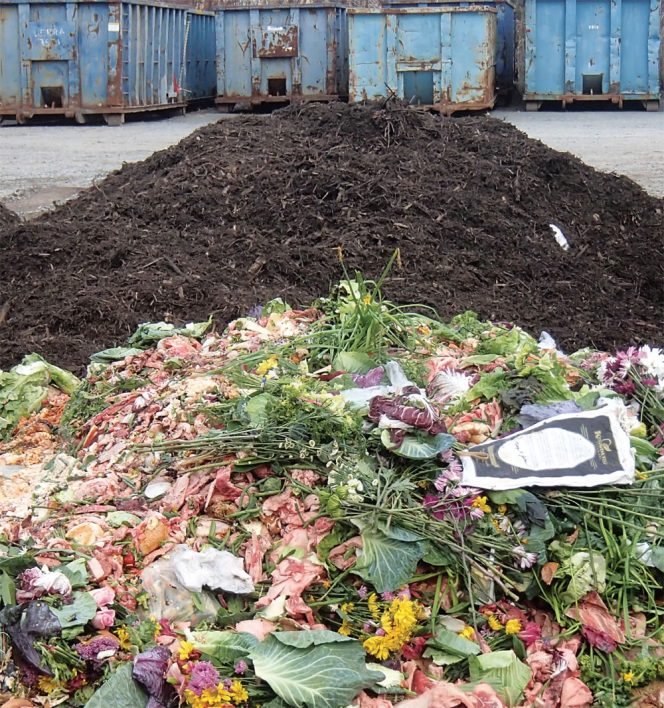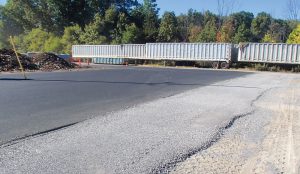The Ulster County (NY) Resource Recovery Agency recently expanded its pilot composting facility to service organics haulers.
Marsha Johnston
BioCycle February 2017

In the first nine months of 2016, the composting facility processed over 1,000 tons of food waste, compared to 670 tons in all of 2015.
With increasing traffic from regional waste haulers attracted by its affordable tipping fees and professional operation, the Ulster County Resource Recovery Agency’s (UCRRA) food waste composting pilot facility in Kingston, New York was expanded in September 2016. “Only 50 percent of the source separated organics received come from Ulster County,” explains Merlyn Akhtar, UCRRA’s recycling coordinator. The other 50 percent come from as far away as Westchester County, NY to the south and Saratoga County to the north, as well as from neighboring states of Connecticut and Massachusetts. Some out-of-county food waste haulers have access to composting facilities that are a shorter drive, but it’s UCRRA’s $20/ton tip fee that makes the difference, even considering extra transportation costs, adds Akhtar.
The pilot facility receives loads from between five and seven private haulers, some of which are collecting from groceries, schools and bakeries, including Hannaford’s and PriceChopper, notes Charlie Whittaker, UCCRA’s composting operations manager. The facility began its original pilot in 2012 and was designed to handle commercial food waste. However, one of the organics haulers, Empire Zero, which makes regular use of UCRRA’s facility, also brings in some residential organics collected from Beacon, New York residents.
Through September 2016, the composting facility, located behind the Authority’s dual-stream materials recovery facility, has processed over 1,000 tons of food waste, compared to 670 tons in all of 2015. Once the operation hit over 500 tons last August, UCRRA decided to ask the NY State Department of Environmental Conservation (DEC) for permission to construct an expanded composting site and to accept more organics. “We had been discussing it all along with DEC,” says Whittaker. “When haulers put a truck out there to collect food waste, we want to make sure we can handle it and make a usable product. We don’t want to run out of room, because once you turn someone away, they generally don’t come back.”
Composting Operations
The Authority’s DEC permit was modified to double its organics capacity to 2,000 cubic yards (cy). The composting site was expanded from a 40-ft by 90-ft area to a 90-ft by 110-ft area, increasing the number of aerated static pile (ASP) zones from 5 to 10. With consultation from Peter Moon of O2 Compost Systems and Training, which designed the original ASP operation, 5 blower units, a screener, a front-end loader and a Bobcat S-850 were added. Whittaker notes that UCRRA has also regularly consulted with and received technical support from Greg Gelewski of Onondaga County Resource Recovery Agency in the Syracuse, NY region, which has a composting facility utilizing the same ASP method, but on a much larger scale.

The composting pad was expanded from a 40-ft by 90-ft area to a 90-ft by 110-ft area, increasing the number of aerated static pile zones from 5 to 10.
With the expansion, the pilot facility is able to handle between 1,800 to 2,000 tons/year of food waste “comfortably.” UCRRA also built a separate 12-ft by 25-ft area for composting road-kill, which is expected to process between 7 to 10 tons/year of mortalities. The road-kill compost will only be used on site for landscaping.
UCRRA staff inspects every food waste load for contamination and to make sure it doesn’t have too much liquid, explains Whittaker. “We don’t take any load with any garbage in it, but that has only happened two or three times in the last year.” Contaminated loads are either directed to UCRRA’s on-site MSW transfer station, or the hauler, if out-of-county, has the choice to take the load back to its locality. The tip fee at the transfer station for MSW is $103/ton, notes Akhtar, which is an incentive for haulers to bring in a clean organics load. MSW collected in Ulster County is trucked to the Seneca Meadows landfill, as there are no active landfills remaining in the county.
Incoming food waste is mixed with wood chips and put into an ASP zone. The mixture sits on lateral pipes receiving forced aeration for 30 days, followed by 28 to 30 days in a secondary area without aeration. Finished compost, which is U.S. Composting Council STA-certified, is screened to remove any bulky material and sold in bulk for $30/ton. Whittaker notes that UCRRA has had no odor complaints since the pilot began in 2012.
With the assistance from the Ulster County Department of the Environment, UCRRA has applied for a grant to help with the composting facility’s further expansion, including purchase of a bagging unit. “Our compost has gotten great reviews from the public, including from one local farmer who found it revived his trouble-prone soils,” says Akhtar.
UCRRA’s primary motive for the operation is to reduce the amount of organics going to landfill. To incentivize haulers to collect food waste, for example, it lowered the food waste tipping fee from an initial $50/ton in 2012 to $30 in May 2013, and again in 2014 to $20. UCRRA hopes ultimately to turn a small profit, and is well on its way, selling nearly as much compost (719 tons) as it has taken in food waste (1,000 tons) year-to-date.
Marsha W. Johnston, an editor with Earth Steward Associates, is a Contributing Editor to BioCycle.










